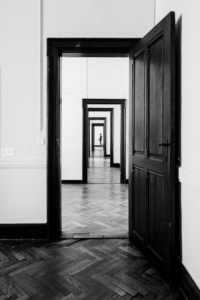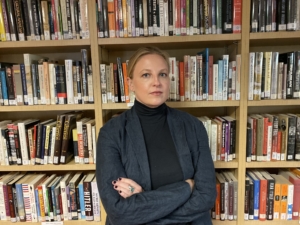Altering Perception as Survival in 2020’s Era
In today’s world of screens, scrolling and endless information, it is hard to not feel overwhelmed. Having access to global news is daunting as it is and adding “fake news” to the chaos of information extends the complexity of comprehension. After three years of bipartisan war in America, I do not like the fact that I have in many ways shut down. Diplomacy seems more like sensationalist theatre. The people in charge seem like clowns. I feel helpless and sad yet on the brink of hysterical laughter. I want to escape into a different reality, and this feeling brought me to think of Aldous Huxley’s The Doors of Perception and that perhaps one way to address this situation is to alter our perceptions to give ourselves a clear purpose. This very human survival trait allows aspects of the future feel approachable and doable.
For those who are unfamiliar with this work, it illuminates the way humans live in search of self-transcendence. Over religion, family, social purpose, humans throughout time often seek a “Door in the Wall,” where one is no longer the self. For Huxley, after using mescaline (a psychotropic), transcendence was found in a realm where meaning and existence were equal to colors and patterns.

Image from a series called “The Doors of Perception” by Koen Jacobs.
This experience and others lead Huxley to believe that we perpetuate our ways of thinking through the preservation of language. He thinks that we, human beings, are the benefactors of communication and also the victims of being told how to decipher the world’s meanings. We regurgitate them over and over.
When I first read this book circa 2005, I loved his dramatic language, wit, and intellect. I was living in France at the time. It was the Bush Era and the “War on Terror.” When there was still glee over the internet’s possibilities: the freedom of information through an interconnected democratic sphere. I had a tiny pay-as-you-go, Nokia phone with only the information capacity of text messages. I carried a camera with film in it. My life and the internet were separate. If I wanted the internet I had to leave my home and search for it. Equally, when I was done, I left it behind.
Around then, I tried psychedelics on the French island of Corsica. It must have been the mix of youth, curiosity, and living in the country Albert Camus was from that turned my perception of the world into a diorama. I saw layers of life added and removed. There was a lack of hierarchy between humans, insects, air, and trees. Mostly, there was a sense of oneness, what the people who invented the internet perhaps wanted to create for the world. The same internet that is now overwhelming, addicting, and making me numb.
Although my psychedelic experience was dreamlike, life still seemed to coalesce with nature and time. Back then, I wasn’t up all night thinking about the levels of CO2 in the air as equivalent to how much more time I have left to live before the apocalypse. I still thought fascist governments were a dying regime. I thought about a better future that was enlightened with many different existences, points of view, perceptions and solutions to the problems I knew existed and needed to be faced, including the environmental, social and economic inequalities of the earth. I had the Obama-era hope that society, equity and policy would improve. I thought there was time.
The clarity Huxley described is that humans have established systemic reasoning in order to make the chaotic world more understandable. However, the languages and semantics humans have created leave out a lot of (nonverbal) communication and comprehension. Life and existential reality have changed immensely in the past two decades. Many of us exist in the world today on a level of virtual reality that can be a phantasmagoric experience on its own, so perhaps the system of reasoning needs to be reevaluated? My main concern is: can our programmed brains think enough out of the box to find resolution to social and environmental catastrophe?
My favorite moment in The Doors of Perception was, during one of the mescaline observation experiments, when Huxley reported he felt particularly outside of “…the world of selves, of time, of moral judgements and utilitarian considerations, […] of self-assertion, of cocksureness, of overvalued words and idolatrously worshiped notions.” […] he began to laugh saying: “What pretensions! Who on earth does he think he is?” […] to humans in general: “Who did they all think they were?”
This is what I feel daily when faced with the onslaught of information showing the destruction and exploitation of the natural world by humans, social inequality, and the political circus. The preposterousness renders a sort of hysteria and then a shut-down; a burn out. Who do we all think we are? Capitalism has instilled a priority of the individual, when the survival of life on earth is dependent on unified, community-based thoughts and actions; a sense of oneness.
There seem to be too many doors open at once: screens, websites, photos on Instagram (and all of the emotions behind seeing and comparing oneself to others), yet I feel increasingly alone. I’m losing hope. Someone once said to me: “we are unable to comprehend the truth of the world all at once.” The doors of information offer too much information for the human mind to grasp, particularly if you care about (or are on the underprivileged side of) social, environmental and economic justice. And with the climate crisis, even just to believe there is a future ahead of us is a challenge.
Now, I see Huxley’s words differently. Their meanings are more profound. We must look beyond human history and habit and alter our perceptions to systemic reasoning because there is no premise for what comes next. If we can alter our perceptions, we can allow ourselves to focus our attention on a single goal and complete it. If we can concentrate on oneness, we may evolve to create something new.
Huxley finishes the book with something that society today can learn from: “[…] the man who comes back through the Door in the Wall will never be quite the same as the man who went out. He will be wiser but less cocksure, happier but less self-satisfied, humbler in acknowledging his ignorance yet better equipped to understand the relationship of words to things, of systemic reasoning to the unfathomable Mystery which it tries, forever vainly, to comprehend.”
Franz is an urban sustainability practitioner and MFA student at Antioch University. With an international background and previous masters’ in urban design, she concentrates her writing on how cities impact the psyches of citizens. She lives in Los Angeles.





